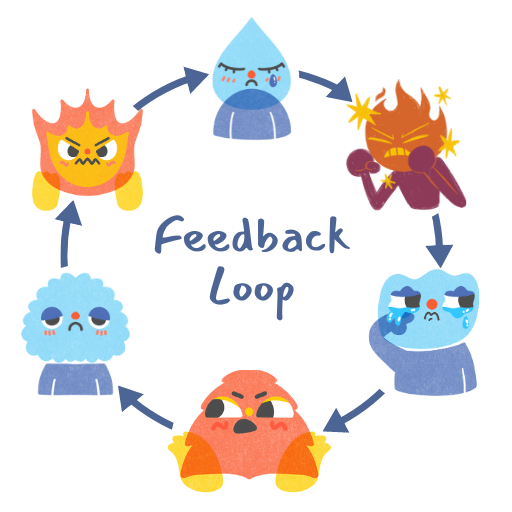Navigating Negative Emotions
Emotions are like a mix of feelings and physical reactions that happen when something affects us. They’re what make us beautifully, and authentically human. They impact how we see things, make choices, and deal with the world around us. They shape how we experience and react to life. But what happens when those emotions are negative?
MindSweeping Emotions Series
Join us every other Thursday on MindSweeper’s YouTube channel for the “MindSweeping Emotions” series. This insightful series is dedicated to navigating negative emotions, providing practical tips and motivational quotes to help you regulate your feelings and build emotional intelligence. Each episode focuses on a different negative emotion, offering strategies and tools to manage and transform these emotions into positive outcomes. A transcript of each video will also be posted on our blog, allowing you to revisit the content at your own pace.
What is Emotional Intelligence?
Emotional intelligence refers to the ability to understand, manage, and navigate one’s own emotions effectively, as well as the capacity to recognize, interpret, and respond appropriately to the emotions of others. It encompasses a range of skills and competencies that contribute to both personal and interpersonal effectiveness.
Negative Emotions and Their Impact
An excessive or prolonged presence of negative emotions can be harmful as they have far-reaching effects across various aspects of our lives:
- Mental health: Persistent negative emotions can contribute to conditions like anxiety and depression.
- Physical health: They are associated with increased stress levels, which can lead to health issues such as high blood pressure and weakened immune system.
- Relationships: Negative emotions can strain relationships, causing misunderstandings and conflicts.
- Cognitive functions: They may impair decision-making, problem-solving abilities, and overall cognitive performance.
- Quality of life: They can diminish overall well-being, affecting enjoyment of daily activities and life satisfaction.
Navigating My Own Negative Feelings
Last year, I faced a really tough situation and experienced anger like I never had before. The lack of justice in the situation fuelled my bitterness, but there was another feeling settling over me—one I had hoped I would never feel again: depression.
Opposing Forces
If my feelings were characters like out of the Pixar movie, “Inside Out,” my anger was putting on boxing gloves, ready for a fight. On the other side of my brain, my depression was preparing for a nap because it didn’t care about anything anymore and thought everything was pointless.
How Is This Even Possible?
My anger was fuelled by disappointed over the lack of justice in the situation, which made me not want to care about anything. This detachment deepened my depression. Meanwhile, my depression was bitter about being depressed! I wouldn’t have to go through this hell again if it wasn’t for what happened. These thoughts fuelled my anger.

The Feedback Loop of Emotions
- My anger was making me depressed
- My depression was making me angry
The feedback loop created by my depression and anger was like a hurricane, drawing in emotions like bitterness and pity, intensifying the storm within me.
The Impact on Daily Life
This phase lasted for months. I felt incapable of doing anything—daily chores, showering, seeing friends—I even struggled to leave my apartment. I knew my anger was hurting me, but letting it go wasn’t as simple as I thought. I began counselling to address it, which made me realize the importance of being able to manage negative emotions. Left unchecked, they can manage you.
Seeking Help and Finding Clarity
While my anger isn’t completely gone, I am happy to say the depression has lifted, and the anger is no longer controlling me. This experience showed me how closely connected our emotional well-being is to our overall mental health.
Turning Negatives Into Positives
Though the experience I faced was negative and painful, it’s actually what sparked the idea to create MindSweeper Collective and the MindSweeping Emotions Series. It is dedicated to helping others understand and navigate negative emotions with grace and self-compassion. My hope is that this series will become a valuable reference for you whenever you’re faced with negative emotions.
Negative Emotions and Mental Health
Mental illness can increase susceptibility to negative emotions by amplifying their intensity and frequency. Developing emotional intelligence empowers individuals to recognize, understand, and manage their emotions better. This awareness not only supports emotional well-being but also enhances resilience in coping with the challenges posed by mental health conditions.
Why Emotional Intelligence Matters
Emotional intelligence is widely valued for its ability to empower individuals in diverse areas of life. It helps us manage our reactions to negative emotions, fostering a greater sense of control and stability while enhancing our understanding of feelings. This clarity enables us to cultivate healthier relationships through empathy and effective communication, crucial for coping with challenges and maintaining emotional balance, essential to overall well-being.
Balance and Moderation
It’s important to recognize that negative emotions are a natural part of being human. They serve a purpose in helping us navigate life’s challenges and understand our needs and boundaries. While they may feel uncomfortable or difficult, negative emotions can provide valuable insights and opportunities for growth. Understanding this can lead to a more balanced perspective on our emotional experiences and encourage us to approach them with self-compassion and acceptance.
Embracing Growth Through Negative Emotions
Negative emotions, despite their discomfort, offer valuable lessons and opportunities for personal growth, resilience, and developing problem-solving skills. They challenge us to examine our beliefs, reactions, and coping mechanisms, prompting self-reflection and introspection. By confronting and processing these emotions, we can gain deeper insights into ourselves and our relationships, ultimately fostering emotional maturity and the ability to navigate future challenges more effectively. Acknowledging the potential for growth within negative emotions encourages us to approach them with openness and a willingness to learn from every experience.
Proactive Steps for Emotional Well-being
Aside from the MindSweeping Emotions series, here are proactive steps you can take to enhance your emotional well-being:
- Be aware of your triggers and emotional responses
- Use mindfulness to enhance emotional regulation
- Develop healthy stress management techniques
- Maintain a balanced lifestyle
- Create positive social connections
- Set meaningful goals
- Establish healthy boundaries
- Practice gratitude and maintain a positive mindset
- Engage in fulfilling activities
- Seek professional support
- Journal about your feelings
Conclusion
The first episode of MindSweeping Emotions will be out next Thursday and the negative emotion we will be taking a look at is: feeling overwhelmed. Something I feel probably 80% of the time. What about you? How often do you feel overwhelmed?
Remember that whenever you feel negative emotions, it’s okay. It’s what makes you human. I hope this series inspires you to learn more about emotional regulation and the way it not only affects your life but also your mental health.
Thank you for reading about this new series. Subscribe to the YouTube Channel to be notified when a new episode is out!




